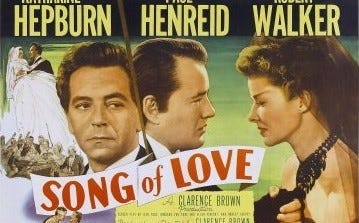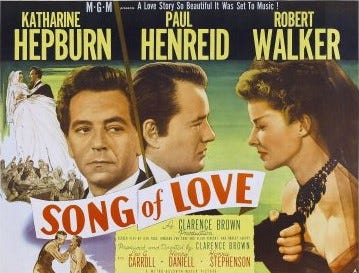I’ve probably mentioned it before at Word and Song, that one of my hobbies is to collect bound volumes of nineteenth century all-purpose popular magazines, usually six months in a volume of about 1000 large pages with smallish print. My favorite is The Century, of which I have some 20 years or so. What I notice from reading these is how great a part music used to play in people’s lives, yet until the Edison Talking Machine came out, the only way you could experience music was by hearing it live, or by playing it yourself. You’d think, then, that people wouldn’t write about music, but they did so, all the time, and in fact The Century ran a series of articles on great classical composers written by other great classical composers, and they’re fascinating — imagine if we had Michelangelo writing an essay on Raphael, or Bernini instructing us on what Michelangelo learned from Donatello! Often, too, the lives of artistic geniuses have been tumultuous, because such talent comes perilously near to madness, and so to learn about their lives is often to enter worlds of great passion. Oh, there are exceptions, for sure — Bach the hard-working family man, Fra Angelico the gentle soul whom everybody loved. But we also get men like Robert Schumann, whose loving marriage to his wife Clara, a talent equal to his own, whose friendship with the young Brahms, and whose catastrophic madness and early death are the subjects of our tender and lovely Film of the Week, Song of Love.
To appreciate the old films in Hollywood’s Golden Age, you will often have to let yourself be brought into the human and personal drama of a situation, without garish political slogans or overbearing dialogue to let you know what you’re supposed to feel. You hear the silences — just as you do in really great music. You understand it when one word means a hundred — just as you do when a single note conveys more power than a whole orchestra in full steam. That’s the case with Song of Love. The setup is made for a certain kind of drama, not of good against evil, but of good against good, when you cannot have both.
The young Brahms (brilliantly played by Robert Walker) shows up at the Schumann house, desiring to study under the professor. He plays one of his piano pieces, while Schumann (Paul Henreid, another of our favorites) listens in astonishment, and Clara enters the room, also astonished — and Brahms sees her for the first time. Clara is played by Katharine Hepburn, who is not a particular favorite at our house, except for her screwball comic role in Bringing Up Baby, her most unusual role as a shy and lonely secretary on holiday in David Lean’s bittersweet Summertime, and her role as Clara Schumann here. You may be interested to know that Miss Hepburn is actually playing the piano in her scenes, instructed by Arthur Rubinstein, who claimed that she was better at it than he was! But you see what is in store: Brahms falls in love with Clara; but he is a good man and grateful to his teacher, and the Schumanns are the loving parents of a large brood of children. Meanwhile, Schumann suffers an intolerable auditory affliction that interferes with his work and ultimately shakes his sanity.
So we have three good people, in what will be various kinds of difficulty. And it isn’t superficial, or easily resolved, for when people like Clara Schumann give their love, as she gave hers to Robert, they give it forever. Watch, and enter a world that isn’t ours.
Once again Internet Archive provides us access to “Song of Love.” Click on the poster above to watch the film.






I too was never a Katherine Hepburn fan, but her piano playing is exceptional, and describing it this way is an understatement. I was truly amazed.
Thank you for the great recommendation. This movie is filled with beautiful music, beautifully performed, and tells a story of love and constancy that (unless a person is one cold fish), warms the heart.
Im so looking forward to this different kind of love story. Our age is confused about many things, especially love and passion. Who has warned that historically, any culture in which none of the carnal passions is sublimated will lose its intellectual and artistic generativity, and finally collapse? All in pursuit of “fulfillment.” But as Christians, we learn [Christ’s] love which requires sacrifice in this life while ultimate fulfillment is on offer in the life to come. Then, in a line from a friend of mine who is quite a writer, we will see, finally, in the face of Jesus, “all the love that has ever loved us.”